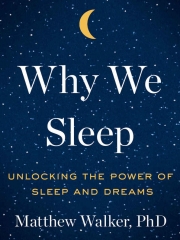Why We Sleep by Matthew Walker
I typically wouldn’t read back to back medical nonfiction, especially since I hadn’t been particularly interested in the topic of sleep. However, the book club at work picked this book, so I obliged. Reading this mostly at night before going to bed was a particularly ironic experience, as the author repeatedly hammered home that a lack of sleep would kill you. For what it’s worth, one silver lining of sheltering in place at home is that I sleep earlier now.
1) Body temperature peaks in late afternoon and is lowest overnight.
This explains why 6pm is always a scary time when I’m sick.
2) Jetlag hits harder when traveling east because it requires sleeping earlier, against a circadian rhythm that’s typically longer than a day.
I have trouble thinking through this east/west travel logic. If you’re going +-12 hours but the flight take 16 hours, are you really sleeping “earlier”? What if you sleep on the plane? Doesn’t it also depend a ton on what time of day you fly? Anyway, on my last two trips to Asia, I’ve had 0 jetlag after getting there and severe jetlag after getting back. I had never experienced this level of jetlag before when I lived on the east coast. It feels like a +- 12hr difference is way better for jetlag than +9/-15, or maybe I’m just getting old.
3) Caffeine works by binding to adenosine receptors. Adenosine normally induces sleep, so when caffeine takes its place, we have less of an urge to sleep.
Caffeine doesn’t seem to work on me, but maybe I’ve just accepted my current state as the norm.
4) The thalamus acts as the brain’s sensory gate. For us to fall asleep, it must block all sensory input from getting to the cortex.
My favorite parts of the book were the neuroscience sections – brings me back to 9.01.
5) Sleep comes in 90-minute cycles. Early in the night, the cycles are mostly made of NREM sleep. As the night goes on, REM sleep makes up more and more of each cycle.
This means that REM sleep is concentrated in the latter half of the night. In turn, getting a short night of sleep disproportionately results in less REM sleep.
6) NREM sleep is characterized by long, rhythmic waves punctuated with sleep spindles.
Sleep spindles still seem like a mystery, but we know they help turn short term memory into long term memory.
7) REM sleep seems to disappear in the ocean.
Seals get much more REM sleep on land than in the sea. Other animal anomalies include sleeping with half their brain. Birds flying in formation would even sleep with the proper half of the brain depending on their position in the formation.
8) Normally, our bodies are paralyzed during REM sleep so we don’t “act out” our dreams.
However, babies in utero haven’t completely developed this ability, so they often punch and kick.
9) A lack of sleep can lead to an overactive sympathetic nervous system, which then leads to a wide range of harmful effects.
Keep calm and carry on.
10) People who live on the west side of a timezone get more sunlight later in the day than people who live on the east side, but everyone wakes up at the same time. Therefore, west dwellers get less sleep.
This is regression discontinuity asking to be analyzed.
I really liked the first half of this book. It took me back to the days of learning biology, which I still believe is the easiest school subject because it all boils down to 1) memorization and 2) failing that, an assumption that the organism will try its best to live (and everything is then derived from this assumption). Unfortunately, the second half of the book was almost unbearable. It was largely a list of questionable, non-causal studies with which the author tried to argue his conclusions. Even the small number of experiments that did measure causal effect made me uneasy, as they typically forced sleep deprivation on participants. Despite these shortcomings, this book convinced me that I should sleep more and will probably become one of the most useful book I’ve read.
